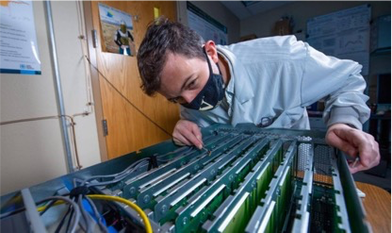Theme
Increasingly, complex control systems require energy-efficient computing, from the edge to large computer centers--including public and private clouds. Successfully harnessing such large collections of sensors and systems are reshaping core elements of our economy, enabling services like autonomous transportation, smart cities, smart agriculture and smart manufacturing. However, the opportunity space that must be considered to build such services is increasingly rich, complex, and diverse. As scale and distribution pushes “The Edge” further out, the need for energy aware analytics and efficient compute, storage and networking resources only grows. Some might say that this is the time for “Green Energy and Green Analytics.”
To build services like smart agriculture while adhering to tight energy restrictions, we must consider all options in analytics, algorithms, compute, storage, and communication. Only by considering all of them can we provide the understanding required on vast data volumes arriving at ever-higher velocities within shrinking time-windows. Fortunately, low-power AI accelerators are emerging across a wide spectrum of devices enabling a transition from large-scale, centralized systems to widely-dispersed computing environments for analytics.
However, the build out of large-scale, geographically dispersed systems presents a multitude of challenges. First, we must manage tens of billions of endpoints capable of collecting new and growing sources of data. To do so, we must consider what mix of resources to devote to compute, storage and network in a wide array of elements: sensors, edge processors, mobile devices, on-premise servers, Smart NICs, Computational Storage, Clouds, and even HPC systems. These elements have diverse power and operating constraints that, in turn, create significant performance, cost, and software development complexities. Poor decisions on where to collect, process, and analyze data will result in unacceptable latencies, erroneous conclusions, lost opportunities to leverage data, and low recall. In system-level terms, we might fail to deliver the intended capability.
In addition, we face other challenges across the system. Despite today’s AI systems providing increasingly energy-efficient solutions per watt, the explosion of data and the demand for its understanding has simultaneously increased the percentage of world-wide power devoted to AI. Pushing analytics to the edge attempts to address this issue by moving compute closer to data. Time-critical decisions and data analytics traditionally computed on centralized systems can be pushed closer to the edge, enabling faster decisions at lower power.
In CLSAC 2021 we explore the greening of computing systems, analytics, and their application across a breadth of core services in modern society. We’ll cover the role energy use is playing in the design, architecture and operations of large-scale distributed systems, energy-optimized diverse hardware platforms, and the pursuit of ‘greenness’ in large-scale analytics themselves.
This year’s conference will consider:
Increasingly, complex control systems require energy-efficient computing, from the edge to large computer centers--including public and private clouds. Successfully harnessing such large collections of sensors and systems are reshaping core elements of our economy, enabling services like autonomous transportation, smart cities, smart agriculture and smart manufacturing. However, the opportunity space that must be considered to build such services is increasingly rich, complex, and diverse. As scale and distribution pushes “The Edge” further out, the need for energy aware analytics and efficient compute, storage and networking resources only grows. Some might say that this is the time for “Green Energy and Green Analytics.”
To build services like smart agriculture while adhering to tight energy restrictions, we must consider all options in analytics, algorithms, compute, storage, and communication. Only by considering all of them can we provide the understanding required on vast data volumes arriving at ever-higher velocities within shrinking time-windows. Fortunately, low-power AI accelerators are emerging across a wide spectrum of devices enabling a transition from large-scale, centralized systems to widely-dispersed computing environments for analytics.
However, the build out of large-scale, geographically dispersed systems presents a multitude of challenges. First, we must manage tens of billions of endpoints capable of collecting new and growing sources of data. To do so, we must consider what mix of resources to devote to compute, storage and network in a wide array of elements: sensors, edge processors, mobile devices, on-premise servers, Smart NICs, Computational Storage, Clouds, and even HPC systems. These elements have diverse power and operating constraints that, in turn, create significant performance, cost, and software development complexities. Poor decisions on where to collect, process, and analyze data will result in unacceptable latencies, erroneous conclusions, lost opportunities to leverage data, and low recall. In system-level terms, we might fail to deliver the intended capability.
In addition, we face other challenges across the system. Despite today’s AI systems providing increasingly energy-efficient solutions per watt, the explosion of data and the demand for its understanding has simultaneously increased the percentage of world-wide power devoted to AI. Pushing analytics to the edge attempts to address this issue by moving compute closer to data. Time-critical decisions and data analytics traditionally computed on centralized systems can be pushed closer to the edge, enabling faster decisions at lower power.
In CLSAC 2021 we explore the greening of computing systems, analytics, and their application across a breadth of core services in modern society. We’ll cover the role energy use is playing in the design, architecture and operations of large-scale distributed systems, energy-optimized diverse hardware platforms, and the pursuit of ‘greenness’ in large-scale analytics themselves.
This year’s conference will consider:
- Opportunities/challenges to improve overall system/analytic performance and efficiency
- Integration of IoT, Cloud, HPC and Edge computing
- Managing the complexity of a highly dispersed and heterogeneous computing environment
- Middleware and Frameworks role in performance and efficiency
- Green Computing Devices
- Green Analytics
- Failure Rates and Resilience
- Vulnerabilities
Organizing Committee:
Jim Ang, Pacific Northwest National Laboratory
John Feo, Pacific Northwest National Laboratory
David Haglin, Trovares, Inc.
Ron Oldfield, Sandia National Laboratories
Richard Murphy, Gem State Informatics, Inc.
Almadena Chtchelkanova, National Science Foundation
Brad Spiers, Committee Advisor
Candace Culhane, Los Alamos National Laboratory
Nick Rogers, Department of Defense
TC Tuan, Department of Defense
Steve Pritchard, Committee Advisor
John Feo, Pacific Northwest National Laboratory
David Haglin, Trovares, Inc.
Ron Oldfield, Sandia National Laboratories
Richard Murphy, Gem State Informatics, Inc.
Almadena Chtchelkanova, National Science Foundation
Brad Spiers, Committee Advisor
Candace Culhane, Los Alamos National Laboratory
Nick Rogers, Department of Defense
TC Tuan, Department of Defense
Steve Pritchard, Committee Advisor
2021 Sponsors
Virtual Agenda (Eastern Standard Time)
Tuesday, October 5
|
10:30 -- 11:00 am EST
|
Welcome to CLSAC
|
|
Session 1: Innovative System Designs for Green Analytics
|
Host: Richard Murphy
|
|
11:00--11:45 am EST
|
Keynote: Domain-Specific Accelerators
|
Bill Dally, NVIDIA
|
|
11:45 -- 12:00 pm EST
|
Student Flash Talk: Causal Discovery for Climate Science and the Energy Exascale Earth System Model
|
Jake Nichol, University of New Mexico
|
|
12:00 -- 12:30 pm EST
|
Darius Bunandar, Lightmatter
|
|
12:30 -- 12:45 pm EST
|
Break
|
|
12:45 -- 1:45 pm EST
|
Panel Session: Venture Capital Host: Brad Spiers
|
|
1:45 -- 2:00 pm EST
|
Break
|
|
Session 2: Energy Efficient Hardware Architectures
|
Host: Jim Ang
|
|
2:00 -- 2:15 pm EST
|
Student Flash Talk: Biologically Inspired Sparse Coding on a Neuromorphic Device
|
Kyle Henke, University of New Mexico
|
|
2:15 -- 2:30 pm EST
|
Student Flash Talk: FPGA-Accelerated Ripples
|
Reece Neff, North Carolina State University
|
|
2:30 -- 3:00 pm EST
|
Gary Grider, LANL
|
|
3:00 -- 3:30 pm EST
|
Catherine Schuman, ORNL
|
|
3:30 -- 3:45 pm EST
|
Break
|
|
3:45 -- 4:45 pm EST
|
Panel Session: Configurability in Future Data Analytic Architectures Host: Nick Rogers
|
|
4:45 pm EST
|
Adjourn
|
Wednesday, October 6
|
Random Access
|
Host: John Feo
|
|
11:00 -- 11:10 am EST
|
David Bader, New Jersey Institute of Technology
|
|
11:10 -- 11:20 am EST
|
Stephen Olivier, SNL
|
|
11:20 -- 11:30 am EST
|
Sustainable Scientific Supercomputing
|
Jeremy Kepner, MIT Lincoln Lab
|
|
11:30 -- 11:40 am EST
|
Dimitri Leggas, Reservoir Labs
|
|
11:40 -- 11:50 am EST
|
Fast and Ethical AI Computing
|
Vijay Gadepally, MIT Lincoln Lab
|
|
11:50 -- 12:00 pm EST
|
SODALITE: Software Defined Accelerators from Learning Tools Environment
|
Antonino Tumeo, PNNL
|
|
12:00 -- 12:10 pm EST
|
State of RAPIDS cuGraph – going big
|
Brad Rees, NVIDIA
|
|
12:10 -- 12:20 pm EST
|
The Coming Sixth Epoch of Distributed Computing
|
Timothy Mattson, Intel
|
|
12:20 -- 12:35 pm EST
|
Break
|
|
12:35 -- 12:45 pm EST
|
Nathan Tallent, PNNL
|
|
12:45 -- 12:55 pm EST
|
Wafer-scale processors for HPC
|
Rob Schreiber, Cerebras
|
|
12:55 -- 1:05 pm EST
|
Continuous analytics for operator readiness using commercial hardware
|
Grant Gillary, Amplio AI
|
|
1:05 -- 1:15 pm EST
|
ExaFlop and new PetaFlop systems in China
|
David Kahaner, ATIP
|
|
1:15 -- 1:25 pm EST
|
Oded Green, NVIDIA
|
|
1:25 -- 1:35 pm EST
|
|
1:35 -- 1:45 pm EST
|
George Cottter
|
|
1:45 -- 2:00 pm EST
|
Break
|
|
Session 3: Applications
|
Host: David Haglin
|
|
2:00 -- 2:45 EST
|
Keynote: The Green Global 5G Network as the World’s Largest Cloud Computer
|
Steve Papa, Parallel Wireless
|
|
2:45 -- 3:00 pm EST
|
Student Flash Talk: POSIX number representations for computing
|
Alexandra Poulos, Clemson University
|
|
3:00 -- 3:30 pm EST
|
Dave Robertson, Analog Devices
|
|
3:30 -- 3:45 pm EST
|
Break
|
|
3:45 -- 4:45 pm EST
|
Panel Session: Greening of Applications
|
Host: Almadena Chtchelkanova
|
|
4:45 pm EST
|
Planning for 2022 CLSAC and Adjourn
|
Committee
|
Thank you for attending CLSAC. See you next year in Annapolis (hopefully)! Please complete the feedback survey.













